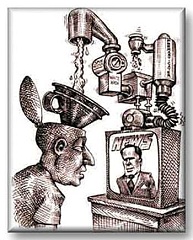"10 strategies of manipulation" by the media
Anonymous
Based on the work of Noam Chomsky

Renowned critic and always MIT linguist Noam Chomsky, one of the classic voices of intellectual dissent in the last decade, has compiled a list of the ten most common and effective strategies resorted to by the agendas “hidden” to establish a manipulation of the population through the media.
Historically the media have proven highly efficient to mold public opinion. Thanks to the media paraphernalia and propaganda, have been created or destroyed social movements, justified wars, tempered financial crisis, spurred on some other ideological currents, and even given the phenomenon of media as producers of reality within the collective psyche.
But how to detect the most common strategies for understanding these psychosocial tools which, surely, we participate? Fortunately Chomsky has been given the task of synthesizing and expose these practices, some more obvious and more sophisticated, but apparently all equally effective and, from a certain point of view, demeaning. Encourage stupidity, promote a sense of guilt, promote distraction, or construct artificial problems and then magically, solve them, are just some of these tactics.



























